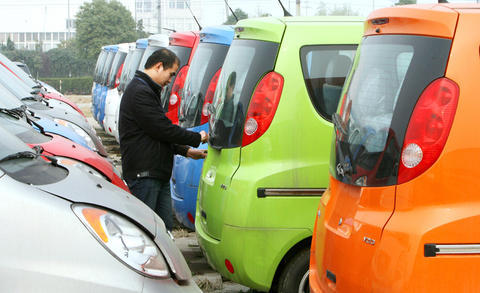China suffered its first defeat at the WTO after it upheld a complaint by the US, EU and Canada over import tariffs on car parts, sources close to the case said.
WTO judges have handed China and the plaintiffs a confidential decision condemning the Chinese import rules, diplomats said, speaking on Wednesday in Geneva on condition of anonymity.
The case is the first time China has been the subject of a complaint that went all the way through to the WTO's Dispute Settlement Body since it joined the organization in 2001.

PHOTO: AFP
Beijing has a minimum local content requirement of 60 percent for home produced cars. If this is exceeded, it then levies the same tariff on the vehicle as it would if it was imported completely built.
China has said the rules aim to prevent tax evasion by companies who import whole cars as spare parts to avoid higher tariff rates.
The plaintiffs argued this measure violates China's WTO accession agreement, which pledged a progressive opening up of its markets.
"It's a move in the right direction," Canada's Trade Minister David Emerson said of the WTO's ruling.
China's commerce ministry did not immediately comment.
"We heard about the case ... and we're looking into it now," a commerce ministry official said.
China is increasingly the focus of WTO complaints after keeping a relatively low profile in its first few years in the organization.
In 2004, the US said it planned to lodge a complaint at the Disputes Settlement Body over tax breaks for Chinese computer chip makers, but the two sides negotiated a solution four months later without the need for WTO arbitration.
Since then, Washington has lodged several other complaints against China with the WTO, including its record on protecting intellectual property rights in October last year.

Authorities have detained three former Taiwan Semiconductor Manufacturing Co (TMSC, 台積電) employees on suspicion of compromising classified technology used in making 2-nanometer chips, the Taiwan High Prosecutors’ Office said yesterday. Prosecutors are holding a former TSMC engineer surnamed Chen (陳) and two recently sacked TSMC engineers, including one person surnamed Wu (吳) in detention with restricted communication, following an investigation launched on July 25, a statement said. The announcement came a day after Nikkei Asia reported on the technology theft in an exclusive story, saying TSMC had fired two workers for contravening data rules on advanced chipmaking technology. Two-nanometer wafers are the most

Tsunami waves were possible in three areas of Kamchatka in Russia’s Far East, the Russian Ministry for Emergency Services said yesterday after a magnitude 7.0 earthquake hit the nearby Kuril Islands. “The expected wave heights are low, but you must still move away from the shore,” the ministry said on the Telegram messaging app, after the latest seismic activity in the area. However, the Pacific Tsunami Warning System in Hawaii said there was no tsunami warning after the quake. The Russian tsunami alert was later canceled. Overnight, the Krasheninnikov volcano in Kamchatka erupted for the first time in 600 years, Russia’s RIA

CHINA’s BULLYING: The former British prime minister said that he believes ‘Taiwan can and will’ protect its freedom and democracy, as its people are lovers of liberty Former British prime minister Boris Johnson yesterday said Western nations should have the courage to stand with and deepen their economic partnerships with Taiwan in the face of China’s intensified pressure. He made the remarks at the ninth Ketagalan Forum: 2025 Indo-Pacific Security Dialogue hosted by the Ministry of Foreign Affairs and the Prospect Foundation in Taipei. Johnson, who is visiting Taiwan for the first time, said he had seen Taiwan’s coastline on a screen on his indoor bicycle, but wanted to learn more about the nation, including its artificial intelligence (AI) development, the key technology of the 21st century. Calling himself an

South Korea yesterday said that it was removing loudspeakers used to blare K-pop and news reports to North Korea, as the new administration in Seoul tries to ease tensions with its bellicose neighbor. The nations, still technically at war, had already halted propaganda broadcasts along the demilitarized zone, Seoul’s military said in June after the election of South Korean President Lee Jae-myung. It said in June that Pyongyang stopped transmitting bizarre, unsettling noises along the border that had become a major nuisance for South Korean residents, a day after South Korea’s loudspeakers fell silent. “Starting today, the military has begun removing the loudspeakers,”